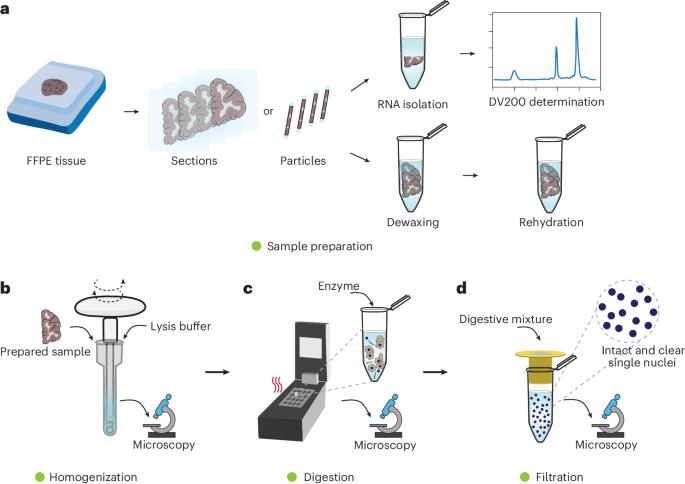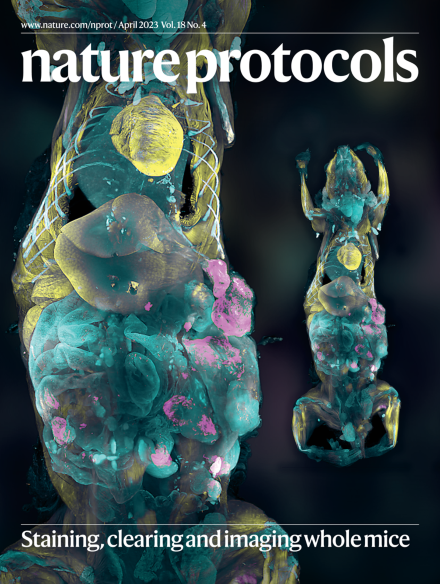使用snRandom-seq对福尔马林固定石蜡包埋样品进行单核总RNA测序。
IF 16
1区 生物学
Q1 BIOCHEMICAL RESEARCH METHODS
引用次数: 0
摘要
福尔马林固定石蜡包埋(FFPE)样品代表了大量有价值的患者材料资源,通常与广泛的临床病史和随访数据有关。然而,在这些存档组织中实现单细胞或单核RNA (sc/snRNA)分析仍然具有挑战性。为了解决这个问题,我们开发了snRandom-seq,这是一种专门为FFPE组织设计的基于液滴和随机引物的单核总RNA测序技术。该方法通过使用随机引物捕获总RNA,与最先进的高通量sc/snRNA-seq技术相比,具有低的重偶率(0.3%),增加的RNA覆盖率和增强的非编码RNA和新生RNA检测。该协议提供了从FFPE样品中分离单个细胞核的综合指南;进行原位DNA阻断、逆转录和dA尾尾反应;条形码单核液滴;准备测序文库。整个snRandom-seq过程可在4 d内完成。该平台是临床标本snRNA-seq的有力工具,在复杂生物系统的研究中有着广泛的应用。本文章由计算机程序翻译,如有差异,请以英文原文为准。

Single-nucleus total RNA sequencing of formalin-fixed paraffin-embedded samples using snRandom-seq
Formalin-fixed paraffin-embedded (FFPE) samples represent a vast and valuable resource of patient material, often linked to extensive clinical history and follow-up data. However, achieving single-cell or single-nucleus RNA (sc/snRNA) profiling in these archived tissues remains challenging. To address this, we have developed snRandom-seq, a droplet- and random primer–based single-nucleus total RNA sequencing technology specifically designed for FFPE tissues. This method captures total RNAs by using random primers and demonstrates a low doublet rate (0.3%), increased RNA coverage and enhanced detection of non-coding and nascent RNAs compared to state-of-the-art high-throughput sc/snRNA-seq technologies. This protocol provides a comprehensive guide to isolating single nuclei from FFPE samples; performing in situ DNA blocking, reverse transcription and dA tailing reactions; barcoding single-nucleus droplets; and preparing sequencing libraries. The entire snRandom-seq process can be completed in 4 d. This platform serves as a powerful tool for snRNA-seq of clinical specimens, with broad applications in studying complex biological systems. This protocol describes single-nucleus total RNA-sequencing of formalin-fixed paraffin-embedded samples by using random primers to capture a broad spectrum of RNAs, including nascent and noncoding RNAs, for microfluidics-based droplet barcoding.
求助全文
通过发布文献求助,成功后即可免费获取论文全文。
去求助
来源期刊

Nature Protocols
生物-生化研究方法
CiteScore
29.10
自引率
0.70%
发文量
128
审稿时长
4 months
期刊介绍:
Nature Protocols focuses on publishing protocols used to address significant biological and biomedical science research questions, including methods grounded in physics and chemistry with practical applications to biological problems. The journal caters to a primary audience of research scientists and, as such, exclusively publishes protocols with research applications. Protocols primarily aimed at influencing patient management and treatment decisions are not featured.
The specific techniques covered encompass a wide range, including but not limited to: Biochemistry, Cell biology, Cell culture, Chemical modification, Computational biology, Developmental biology, Epigenomics, Genetic analysis, Genetic modification, Genomics, Imaging, Immunology, Isolation, purification, and separation, Lipidomics, Metabolomics, Microbiology, Model organisms, Nanotechnology, Neuroscience, Nucleic-acid-based molecular biology, Pharmacology, Plant biology, Protein analysis, Proteomics, Spectroscopy, Structural biology, Synthetic chemistry, Tissue culture, Toxicology, and Virology.
 求助内容:
求助内容: 应助结果提醒方式:
应助结果提醒方式:


